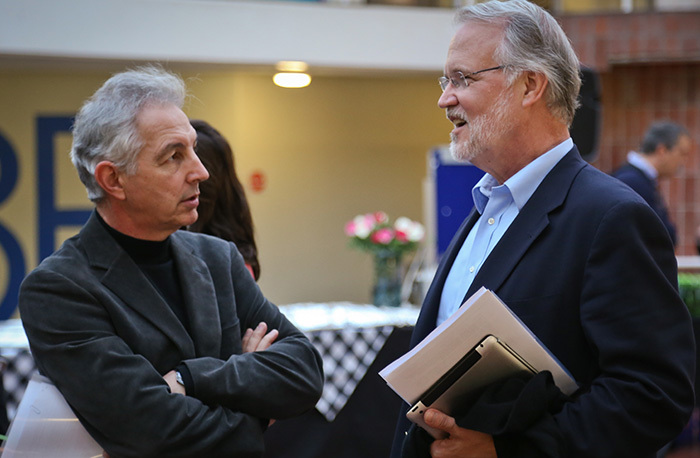LSE-UCT July School: New lessons, new friends and new networks
01 July 2014 | Story by Newsroom
Learn not just from lecturers, but also from your fellow students, was the message to scholars at the launch of the second LSE-UCT July School on 29 June 2014.
Students from a variety of disciplines, countries and continents have converged on the Cape Town campus to take university-level courses focused on pertinent issues affecting Africa. These courses will be taught by a collaboration of academics from UCT and the London School of Economics and Political Science (LSE) over the next two weeks.
"All of you have interests in gaining an African perspective on a whole lot of issues around economics, development, globalisation, inequality, and the trajectory of the continent," UCT Vice-Chancellor Dr Max Price told the assembled scholars, urging them to maintain the connections they make at the July School throughout their careers. "I'm hoping that not only will [this experience] be stimulating academically and intellectually, but that socially you will also go away from here with new friends and new networks."
The extraordinary global university
With 144 students from 44 countries, the LSE-UCT July School presents not only an opportunity to learn from established experts in the field, but also from each other, added Professor Craig Calhoun, LSE director.
While participants could look forward to learning from world-leading scholars, Calhoun reminded them that they were also "world-leading students": "The chance to get to know each other, in and out of class, is a lot of what the July School is about '“ so take full advantage of your fellow students' presence and at the same time learn and build a network.
"This is something we value a lot at the LSE '“ that is, the extraordinary global university. Students can learn as much from each other as they learn from their teachers, in a different way."
Learning by doing
In line with the idea of a global village, July School students are sinking their teeth into courses like Africa and Global Transformation: The rise of emerging powers and a new international order, premised on the idea that to understand Africa's burgeoning relationship between emerging economic powers like China, India and Brazil, we need to recognise the canvas of economic, diplomatic and security rationales against which this relationship is set.
Many of the courses complement theory with a practical component. Take Business Model Innovation at the Base of the Pyramid: Cape Town and beyond, for instance. Once students have been introduced to theories around the economic, social and political opportunities and constraints of people living in poverty, they partner with local entrepreneurs based in the Cape Flats to design business models that can maximise social outcomes while remaining economically viable.
In between the coursework, a social and cultural programme will allow students to come up for air and get to know the city and its environment.
Story by Yusuf Omar. Image by Je'nine May.
 This work is licensed under a Creative Commons Attribution-NoDerivatives 4.0 International License.
This work is licensed under a Creative Commons Attribution-NoDerivatives 4.0 International License.
Please view the republishing articles page for more information.










